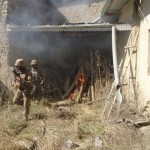Islamabad, Pakistan: Prime Minister Shehbaz Sharif’s diplomacy has brought the fruits at last and the International Monetary Fund (IMF) has reached a staff-level pact with Pakistan on a $3 billion stand-by arrangement for the next nine months.
Despite receiving almost “No response” from the IMF head, PM Sharif kept calling MD IMF Kristalina Georgieva on the phone, asking her for a meeting. At last, they had a meeting recently in Paris and after this meeting, Sharif was confident that Pakistan would get the IMF support.
Pakistan had gone through floods in the last year that according to United Nations was unprecedented in human history and floods eroded agriculture based on this South Asian agrarian society. However, despite the pledges, Pakistan had yet to get the donations the world promised it and the IMF was avoiding going into a contract to release the money to Pakistan. Moreover, IMF made it conditional for other donors that Pakistan would be allowed to get loans and financial support from other countries when IMF would give the Ok to them. Pakistan had gone through the worst financial phase of its history in the last year and IMF official Nathan Porter on Thursday expressed his viewpoint that Pakistan’s economy had faced several challenges in recent times, including devastating floods last year and commodity price hikes following the war in Ukraine.
According to international experts, Pakistan is avoiding structural reforms that are needed to stabilize its crumbling economy and these reforms include a cut off in subsidies of over 2 billion USD Pakistan government is giving to the elite class, restructuring its pension policy in which a person can go to retirement and start taking pension although pension age is 60 plus year of age and then same person can join another public sector office and then he or she gets a pension from this new office also after retirement. Moreover, IMF claims that over 150 industries run under the corporate sector are still tax-free in Pakistan and that not only hamper taxation structure rather it does not provide a level field playing for purely private sector-run businesses in the same fields where this corporate sector is getting tax free status. International organizations are also against increasing salaries of public sector employees when Pakistan is earning less than its expenditure on salaries and salaries are being given from loans it is taking from the national and international banking system.





